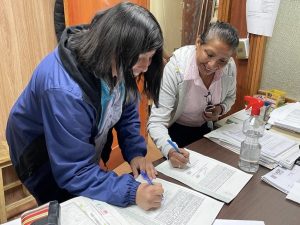In June, Eyes of the world signed the implementation agreement for the Eyes of Bolivia 2022-2024 programme with the funder CBM Global Disability Inclusion. CBM Global works to break the cycle of poverty and disability, treating and preventing the conditions that lead to disability in various countries worldwide. And, in Bolivia, it shares objectives with the Eyes of the world Foundation that already materialized in the 2019-2021 programme.
The current programme builds on previous results and experiences and will be carried out in collaboration with three local partners, led by Eyes of the world, to strengthen inter-institutional learning between local entities and allow the programme’s impact to be expanded in the departments of La Paz, Oruro, Tarija, and Santa Cruz.
In Tarija, the collaboration will take place with the Fundación Desarrolo y Salud Solidaria (FUNDESSOL), whose objective is to improve the quality of life of the population through comprehensive development projects with an emphasis on eye health. Pastoral Social Cáritas Coroico will reinforce the programme in La Paz, working for the human development of the most vulnerable populations in the Amazon area and promoting exercising the right to health. And in Santa Cruz there will be the support of Fundación Tsaí, whose mission is to offer quality health care so that people have a full life and comprehensive health.

The programme covers three axes:
- Improve access to cataract surgeries for the rural population and the quality of interventions with the start-up of a surgical training laboratory in Oruro.
- Identify visual deficiencies in childhood and adolescence, providing the necessary refractive treatment and focusing the action on the schools themselves developing their eye health plans in coordination with the public health system.
- Strengthen and improve the management of the governing entities of the public health system for the exercise of stewardship in eye health within the framework of the SUS (Universal Health Insurance).
At the end of the project, it is expected that the coverage of cataract surgeries in the health system will have increased by 15% and that 105,900 people will have received eye care, with particular attention to women, who account for 61% of blind people in Bolivia.